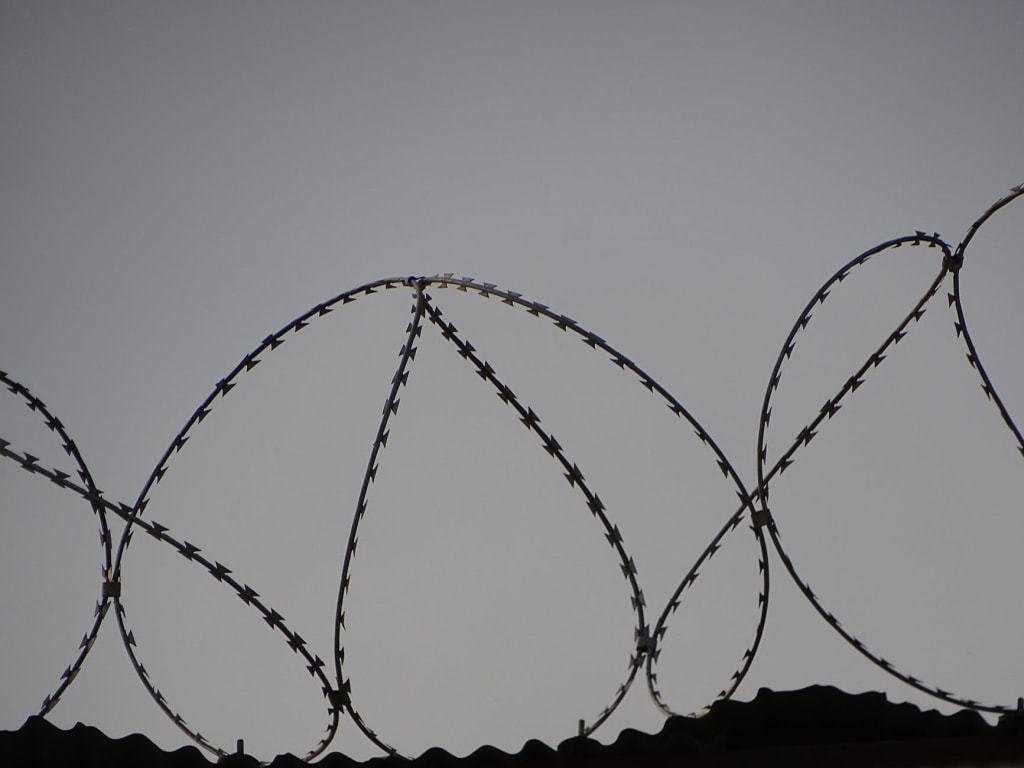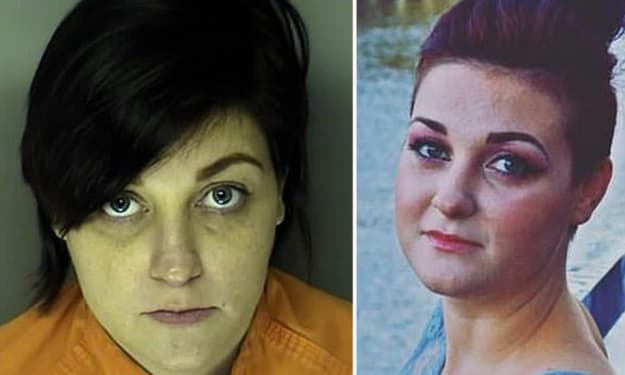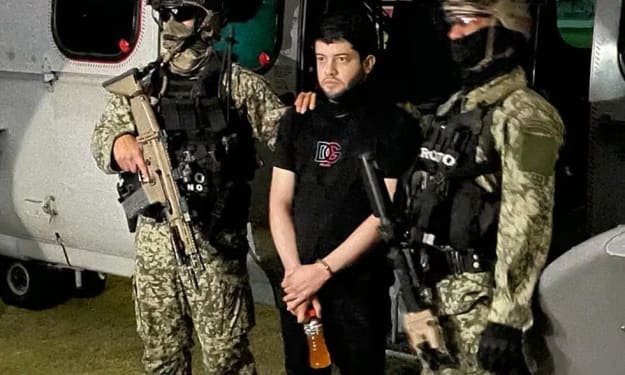Punishment and Privilege
My Experience With a Broken Criminal Justice System

I was six- or seven-years-old the first time I burned myself. My dad was taking night classes at the time, and I was home with my mom and brother getting ready for dinner. I remember my brother was in the dining room, strapped into a high-chair gleefully shouting to himself and tossing snacks in the air. My mom had run to the car to grab the last of the groceries we’d just picked up, my dog Lucky was barking from the living room, and then running to me, nudging my chest with his snout as if to say, “Hey, did you hear that too?!”
Spaghetti was a popular dish in the house because, for a picky kid like me, it was easily simplified to plain noodles and sauce. My mom, bless her heart, had a pot with meat sauce cooking for her and my dad and off to the side a small sauce pan heating plain tomato sauce for my brother and I. I remember I’d pushed a chair up to the counter top, leaning carefully over the counter next to the stovetop watching my mom chop and stir, and most fascinatingly the large pot filled with water began to dance and jump up in the pot.
Picking up my brother and walking toward our bedroom down the hall I remember clearly my mom said, “Now Patrick, stay away from stove. It’s very hot, okay?” and I also remember clearly responding “uh-huh,” and while I was listening, and I understood what she was saying, I’d mostly already made up my mind, and I was gonna touch that water. I remember shouting loudly, then realizing I needed to be quiet, lest I give myself away. My mom came running back to the kitchen, my brother’s curly blonde hair bouncing up and down, his impish grin a perfect paradox to my mom’s panicked eyes. I was holding my fingertips tightly, and trying not to cry and my mom came and with one hand guided and consoled me while simultaneously strapping my brother back into his high-chair.
I wasn’t really burned as much as shocked, my fingers stung for most of the evening, and I’d learned my lesson most certainly: boiling water is not to be touched. While I certainly could have taken my mom’s word for it, this was just the first of many times in my life I would choose to learn something “the hard way.”
I was 19 when I got arrested for the first, and thankfully only, time. I wasn’t a bad kid, but as I laid out before, I often found myself getting into what some might call mischief. So, it was on that fateful summer night in 2008 with a couple friends, that I had my first real taste of the police, and it was an experience that at the time I found to be both horrifying and comical. Spending a night in a jail for anybody is a scary situation, and for myself it was no different. I was drunk for most of the beginning of the experience so I joked around with the kids in the holding tank I was in. I talked back to the correctional officers. I remember taking a photo and pressing my fingers into ink and being flippantly annoyed by the entire situation. “Is this really a great use of your time?” I had asked one of the officers. “A couple of kids smoking weed in a park. This is who you are arresting now?”
When I woke up someone was handing me what I guess was a toothbrush and, wrapped in plastic, was what I believed to be bread with bologna on it and a small mustard packet. I set it on the bed next to me and stared at it for a moment, then stood up to brush my teeth. I was in a holding room with some 30 other men and as I walked toward the area that appeared to have toilets, I could the smell the scent of homelessness, alcoholism and drug abuse all around me and the reality of my situation, along with a hangover began to overwhelm me. I remember turning my head toward the latrines and locking eyes with some middle aged man while he took a shit, it could have been Charles Manson for all I know, and then I remember turning around, deciding my teeth were just fine the way they were. I sat back down on my bunk and looked back at the bologna sandwich.
“Don’t look like you’re gonna eat that, bro.” I heard from the bed above me.
I looked up to see a tattooed 20-something-year-old, rolled onto his side and looking down at me. I agreed silently and reached the sandwich up to his bunk.
“What’d you do man?” he asked as he unwrapped the sandwich and threw the plastic to the floor.
“Didn’t listen to the police,” I murmured, recollecting exactly what it was that I had done.
It had been, on my part, an avoidable arrest; I’d been walking from the park to my friends’ car in the parking lot to get another case of beer. While at the car, I’d had a police officer stop me to ask for my ID. He’d been at the other end of the lot and noticed the PBR can I’d perched on the roof of the car while I rummaged around. I was being interrogated and providing my license and in my infinite wisdom decided to get mouthy with the officer. Attempting to light a cigarette, the officer had asked me to keep my hands out of my pockets, where he could see them. Annoyed by the entire situation, I continued attempts to reach for my cigarettes, and by this time my friend had come back to the car and while the officer was distracted getting his license, I remember I finally pulled a cigarette all the way out, I lit it, I exhaled, and then was immediately arrested.
“Shit, you’re a dumb motherfucker,” my bunkmate said laughing and shaking his head as he chewed on my sandwich. “You’ll be out of here by noon, man.”
I remember his name was Michael, and he was 22, he’d been arrested the week prior, he’d been driving a friend’s car, without a license, and when he was pulled over, they searched the car and they found drugs, cocaine to be specific, and he was arrested. He claimed the drugs weren’t his, probably his friend’s or who knows, but he was on probation and it didn’t really matter what he said. He was going to jail. I asked him why he was on probation and he explained he’d gotten busted for possession of marijuana when he was in high school and the judicial system had just kind of been following him around since. We talked for a while after that about the Seattle music scene, and Capitol Hill where both of us spent most of our time, and toward the end of the conversation I asked him, how come he got pulled over in the first place?
“Driving while Black,” he responded bluntly.
After a phone call to my mom, I got bailed out by family that morning, and I never saw Michael again. I walked out of the jail that day to my friends waiting for me outside and we drove back to my apartment and I told them about how I’d been charged with minor in possession of alcohol and possession of marijuana. I was ashamed of my actions, and I was scared of the consequences. Was this going to follow me around forever? How was I going to get a job if I had to explain this to every potential employer? Was I going to get drug tested now?
A few weeks later I remember meeting my Grandfather, an attorney, at the court house. We met with the prosecutor in a small room before walking into the court room. The prosecutor looked over my arrest report, she looked at me, and she and my Grandpa discussed the amount of marijuana I’d had on me, a detail I’d forgotten to disclose.
“Okay, we’re going to drop the marijuana possession charge. You’ll need to do eight hours of community service and complete a four-hour course on drug and alcohol abuse,” she’d said and slid the papers back into a file and handed them to her assistant who walked out of the room.
“Then what?” I asked.
“Then this will be dropped from your record,” she responded blankly and stood up from the desk and walked out of the room.
I remember the judge saying things, and I remember nodding and saying some words back and then being assigned to a class and some community service. I ended up showing up to do community service a couple weeks later at a homeless shelter in Belltown, I was early and the guy who was in charge told me he was going to have plenty of help that day; he signed my papers and basically told me to get lost after a couple of hours picking up trash on 2nd Ave. The drug/alcohol class wasn’t much different; we watched an hour long video and answered some questions about our drug/alcohol use and after a few hours we got our papers signed and my experience with the criminal justice system was over. The class was in the building across the street from the jail I’d been in just a month prior, and that day while walking past it I remember looking up at those small windows and wondering if Michael was still in there, waiting for his court date, unable to pay for his bail.
That summer my understanding of the criminal justice system was forever changed, and although I’d been aware of the idea of white-privilege, at no point in my life had I ever experienced it in such an obvious and unfair way. In the years since, I’ve often wondered how things might have gone differently had I not been a blue-eyed, white-faced kid on that summer night. Do I even get asked to take my hands out of my pockets, or do I just get shot? Do I get charges dropped before I even enter the court room, or do I get the book thrown at me? If I’m shot, do I survive? If I’m prosecuted to the full extent of the law, do I have a criminal record? Do I get the job a few months later which ended up providing me the income that I used to buy a home, to help pay for education to try and better my life? It made me contemplate other times in my life, going back to elementary school and middle school, what other ways had I been disciplined differently based on my privilege? How did that help my grades that otherwise may have suffered? How come despite constant unexcused absences and trouble with teachers, I was never once suspended? How come when I was caught with weed in high school nothing really happened, but Michael got arrested, and got a record that was following him around? This type of apparent privilege and mercy for one segment of the population versus targeted inequality, and harsh judgement for another segment of the population is systemic and it’s important that we work toward identifying and stopping these prejudices that make for these severely different experiences for relatively similar infractions.
I’m thankful I was given these chances to do better, and with these opportunities I’ve continued, to varying degrees of success, to work towards doing the right thing more often than the wrong thing. I know these changes can’t happen overnight, but my hope is that by sharing this story, people will see that it's important we provide other human beings with the same type of empathy and forgiveness we’d hope would be bestowed upon us or our loved ones when they make a mistake, or act foolishly. I’d like to believe I’m not a bad person, I’ve made bad choices, and I’m grateful that my life has not been completely defined or rerouted by those choices and the criminal justice system. I only wish the same were true for others.
About the Creator
Patrick O'Neill
I am a NW born & bred composer and writer currently living in Seattle, WA with my wife and two dogs. When I am giving my ears a break I enjoy writing about politics, social issues, race and everything else that keeps me up at night.






Comments
There are no comments for this story
Be the first to respond and start the conversation.